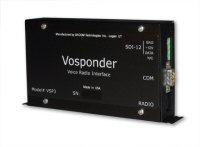This product is no longer available.

| Services Available | |
|---|---|
| Repair | No |
| Calibration | No |
| Free Support | No |
Overview
The VSP3 is a radio interface that converts data into voice messages that can be transmitted via a UHF or VHF transceiver. It allows customers to call their site using a hand-held radio and receive a verbal report of real-time site conditions.
The VSP3 uses phonetic native text-string-to-speech conversion, which provides for an unlimited vocabulary.
Ideal applications include fire weather, avalanche forecasting, local weather monitoring, irrigation control, water level monitoring, water quality, and industrial process control.
Read MoreBenefits and Features
- Broadcasts voice data to a hand-held radio with a matching radio frequency
- Converts data from SDI-12 compatible data loggers, data acquisition systems, or sensors into voice messages
- Provides unlimited vocabulary
Images

Detailed Description
The VSP3 Vosponder, manufactured by DACOM Technologies, Inc., allows customers to call their site using a hand-held UHF or VHF radio and receive a verbal report of real-time site conditions. Ideal applications include fire weather, avalanche forecasting, local weather monitoring, irrigation control, water level monitoring, water quality, and industrial process control.
Customers initiate voice transmissions by pressing buttons on a hand-held radio. Once initiated, the Vosponder uses an SDI-12 interface to collect raw digital data from a Campbell Scientific data logger. The Vosponder then converts the collected data into natural human speech and recites a verbal message.
Specifications
| Operating Temperature | -10° to +55°C |
| Programming Interface Port | RS-232; communications parameters, data rate 2400 bps, no parity, 8 data bits, 1 stop bit, XON/XOFF |
| Data Interface Ports | SDI-12 three wire interface, emulates either a record (master mode) or a sensor (slave mode) using a subset of the SDI-12 protocol definition |
| Output Level | 10 to 2.5 mV |
| Output Impedance | 5 kohm nominal (capacitor blocked) |
| Carrier Operated Squelch Input | 1.5 to 5 Vdc @ 10 mA (max) |
| Input Level | 25 mV to 5 V (factory adjustable) |
| Input Impedance | 10 kohm dc resistance (not capacitor blocked) |
| Power Requirements | 10 to 16.8 Vdc |
| Power Consumption @ 12.6 Vdc |
|
| Dimensions |
|
| Weight | 380 g (0.9 lb) |
DTMF Decoder |
|
| Twist | -10 to +6 dB |
| Maximum Signal-to-Noise Ratio | 10 dB |
| Minimum Detect Tone Duration | 40 ms |
| Minimum Interdigit Time | 30 ms |
Compatibility
Note: The following shows notable compatibility information. It is not a comprehensive list of all compatible or incompatible products.
Data Loggers
| Product | Compatible | Note |
|---|---|---|
| 21X (retired) | ||
| CR10 (retired) | ||
| CR1000 (retired) | ||
| CR10X (retired) | ||
| CR200X (retired) | ||
| CR206X (retired) | ||
| CR211X (retired) | ||
| CR216X (retired) | ||
| CR23X (retired) | ||
| CR295X (retired) | ||
| CR3000 (retired) | ||
| CR500 (retired) | ||
| CR5000 (retired) | ||
| CR510 (retired) | ||
| CR800 (retired) | ||
| CR850 (retired) | ||
| CR9000 (retired) | ||
| CR9000X (retired) |
Additional Compatibility Information
Radio Requirements
A minimum of two radios with matching frequencies is required. One radio connects to the Vosponder at the remote site; the other radio resides at a mobile site or base station. Our RF310, RF312, and RF313 radios can be used at the remote site. The radio at the mobile site or base station must have a speaker, a keypad, and the ability to issue Dual Tone Multi-Frequency (DTMF) tones.
Data Logger Considerations
The VSP3 communicates with the data logger via the SDI-12 protocol. An SDI-12 cable is shipped with the VSP3 to connect it to the data logger.
Enclosure Considerations
A desiccated, non-condensing environment is required. The VSP3 includes built-in keyhole flanges for mounting to the backplate of a Campbell Scientific enclosure.
Documents
Privacy Policy Update
We've updated our privacy policy. Learn More
Cookie Consent
Update your cookie preferences. Update Cookie Preferences